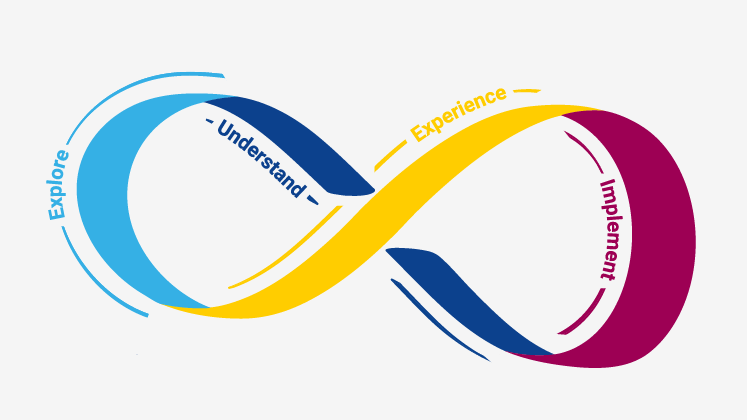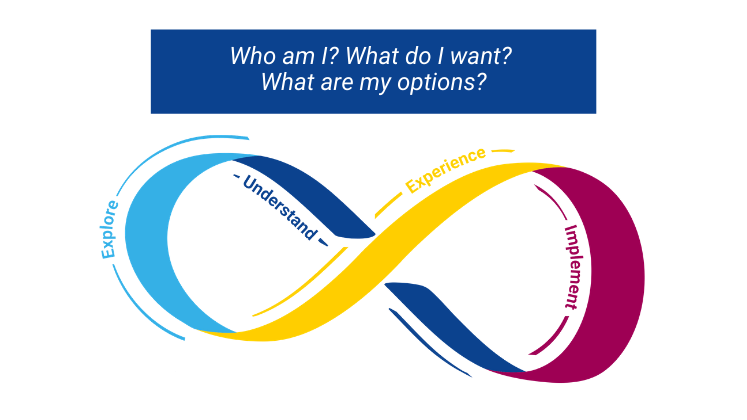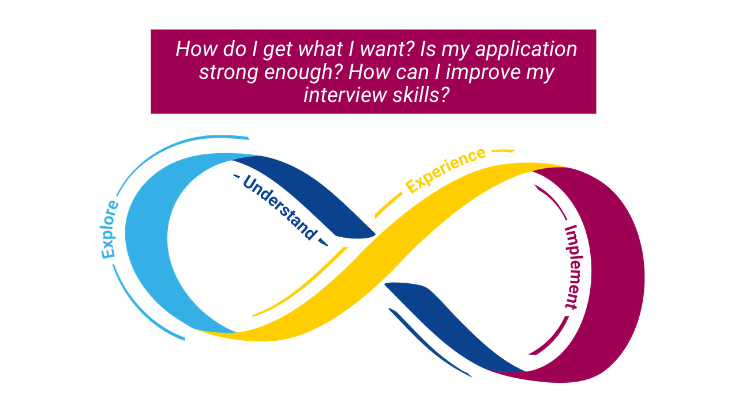Overview
Managing a successful and satisfactory career – whatever your interests, motivations and skills, whatever that means to you – is complex. Students join LSE at different stages of career readiness. Some of you haven’t really started thinking that much about what you’re going to do after your studies, some have a clear path in mind and are already focused on applications and interviews, others are somewhere in between.
Today’s workplace is constantly evolving, jobs exist now that weren’t thought of a few years ago, opportunities fluctuate and vary with changing economic realities. No one sector is easier to access or less demanding in its expectations of applicants.
Our goal is to support you with all this and lay the foundations of effective ongoing career management that will continue to help you as you move beyond LSE and navigate the opportunities and challenges in the years ahead.
Career development cycle
We use our career development cycle (CDC) to help you understand and articulate your own career readiness, and, very practically, identify the kinds of activities that will help you move forward.

As an LSE student and graduate you’ll be asked at specific points in the year to share information about your career readiness and update your career thinking.
We use this information to provide you with tailored communications and a personalised dashboard to support you no matter where you are in the cycle. Here you’ll have access to a combination of suggested events, workshops, information and guidance that will help you clarify your thinking, expand your skills and give you the tools you need to succeed.
How does it work in practice?
We believe it’s helpful to see the process of deciding on and planning a career in terms of four distinct stages; understand, explore, experience and implement. You’ll find a description of each below, together with some key questions that will help you decide where you are. Wherever this is, however ready or unready you feel, you will find suggested actions you can take to help you move forward and get you to where you wish to be.
This is an iterative process. Sometimes new information, a new experience or changing personal priorities will throw doubt on your original plans. Be comfortable with this, be willing to change direction as you discover new things about yourself, or in response to changing market realities.

Taking the time to reflect on who you are and what you want, as well as getting to grips with the different opportunities open to you and the way the job market works, will help you make good decisions in the future.
We can help you think about your skills, your values, your motivations and understand how these relate to possible future career choices; we offer the chance to learn about different career paths.

Once you start getting some ideas, however vague, about things you might like to do, we reckon it’s a great idea to find out as much as you can about what it’s really like to do that particular job or work in that sector. In fact, even when you have a pretty strong sense of what you want, it’s worth using your time here to the full: look into different possibilities, keep an open mind and challenge assumptions you’ve already made. Remember there’s lots out there that you probably just haven’t had the chance to find out about yet. We know that if you spend time now getting to know what you want and why, you’ll be more likely to be successful when it’s time to make applications.
We'll give you opportunities to investigate lots of different sectors and roles, to get to know employers and deepen your understanding about what different kinds of work really involve.

We know that employers really value experience, whether that’s the part-time job you do alongside studying, your extra-curricular activities, the volunteering you do every week, the project you're working on as part of your course or the internship you’re hoping to do in the summer.
Whatever you’re planning to do when you graduate, it’s going to be really important to have practical experience that you can draw on, to show employers or academics what you can do. We can help connect you with opportunities, help you understand how your extra-curricular activities relate to what you want to do, help you reflect on your experiences, the skills you’ve gained and how they complement your academic studies – and help you think about how to present all this to potential employers.

Once you’ve worked out what you want to do, you’ll need to persuade employers you’ll be a good bet for them by putting together the strongest application you can.
We make sure that we keep in touch with employers to know what they are looking for. We can help you make sure your CV is as good as it can be, that your cover letter is strong and convincing, that you can articulate clearly your strengths, the experience you have that’s relevant to the job and why you particularly want to work for this employer. We’ll help you prepare for rigorous applications processes, give you feedback and the chance to practice the skills you’ll need.
Reflection
This is not a linear process, and we would encourage you to build in time to reflect and reassess on an ongoing basis. Recognise that changing direction or going back to the drawing board can be the most meaningful sign of progress.
As you attend our events and appointments, we will ask you to reflect on what you have learned from the sessions, measure whether your needs are being met and decide on what you should do next. We take this information seriously and analyse it carefully, adapting and developing our programme in the light of what you tell us.